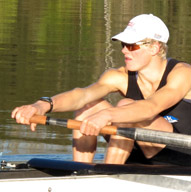
NZ Representative Rower
When did you first realise that you had a different way of thinking?
I had always had a bit of trouble through primary school, but it was when I hit high school that I really began to feel separation between myself and my classmates. In 2004, when I was in the fifth form, I was finally diagnosed with dyslexia.
What was your experience of school?
At high school I tended to avoid subjects that involved a lot of reading and writing, even though I felt they would be interesting. Instead I went into more practical subjects, such as PE and Art, as I was good at them and my dyslexia didn’t affect my progress. Also I found comfort in these areas as people didn’t realize I was any different. And often I could grasp the concept of the lesson in these practical subjects better than a lot of my classmates.
You’ve achieved so much for someone so young – what ís your secret?
Regardless of my dyslexia I always had a strong desire to achieve at a high level. So I strived to excel in the areas that came naturally to me & I guess in some ways to make up for shortcomings in other areas.
Sport has become a huge part of my life and the main secret to my success has been putting 100% into my sport every day, and that has got me where I am today. I was a New Zealand representative rower at junior, under 21, under 23 and elite levels before now being selected, aged 20, for the New Zealand team at the 2010 Elite World Champs.
What are the main personal challenges that you have had to overcome?
In my last few years of high school, my interest in academia started to dissolve because I realized I could get recognition from achieving in the realm of sport. It was then a real struggle to maintain my interest and progress in school subjects when all I really wanted to do was focus on my sport.
In hindsight, I could have benefitted from putting a bit of extra effort into my schooling during this period as it may have better prepared me for tertiary education. In 2010 I received a Prime Minister’s Scholarship to study and have passed two business diploma papers, which has been a huge step.
What do you think are some of the positives and negatives of dyslexia?
Anyone with dyslexia can relate to feeling isolated in the classroom amongst their non-dyslexic peers, and to the difficulties of a curriculum where reading and writing are such a huge part of learning. However, I think there are some really special qualities that come with dyslexia. Seeing the world in a different way can open new doors and give new perspectives which provide diversity. If everyone thought about things in the same way it would be a bit of a boring world.
What advice would you give young New Zealanders who are dyslexic?
Mainly to persevere with school; find something that takes your interest; and be as good as you can be at it. Literacy is important, and the best thing is to be open with your teachers and family so they can help you work through it. In saying that, however, there is more to life than just reading and writing and it can be a lot of fun exploring that. Keep striving high because you never know your limits.
Click here to return.
